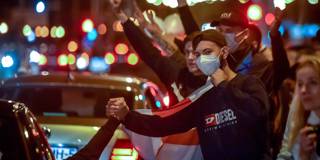OnPoint Subscriber Exclusive
The Big Picture brings together a range of PS commentaries to give readers a comprehensive understanding of topics in the news – and the deeper issues driving the news. The Big Question features concise contributor analysis and predictions on timely topics.

Belarus Reborn?
Since claiming an overwhelming victory in a presidential election that lacked any semblance of credibility, Aleksandr Lukashenko, the former Soviet collective farm manager who has ruled Belarus with an iron fist since 1994, has lost whatever remaining legitimacy he may have had. But he has already shown an increasingly hostile and mobilized public that he won’t go without a fight.
In this Big Picture, Mitchell Orenstein and Valery Yakubovych of the University of Pennsylvania highlight the remarkable candidacy of Svetlana Tikhanovskaya, an English teacher thrust into the role of challenging Lukashenko after the regime jailed her husband and another candidate and charged a third with forging signatures on his ballot petition. Although none of the campaigns were under any illusion that uniting behind Tikhanovskaya would prevent a foregone conclusion, the opposition forces’ discipline and creativity foiled the political spectacle Lukashenko craved.
The same discipline and creativity – and the high profile of women activists – have been a central feature of the massive post-election protests that have swept not just the capital, Minsk, but cities and towns throughout the country. This is apparent from a series of trenchant reports by Sławomir Sierakowski, the director of the Institute for Advanced Study in Warsaw and one of the few Western observers on the ground in Belarus, where the regime has blocked the Internet.
Despite the opposition’s unequivocal commitment to nonviolence, the security forces’ forbearance lasted barely a day before protesters were targeted by tear gas, rubber bullets, and other projectiles – some obtained, to Sierakowski’s chagrin, from Poland. And yet, despite thousand of arrests and hundreds of injuries, the protests have continued, with actions led by women again leaving the regime flummoxed – and many security officers refusing to carry on.
Paradoxically, if Lukashenko falls, says Anders Åslund of the Atlantic Council, Belarus will be well positioned to launch a transition to a normal market economy, thanks to the preservation of two key Soviet-era assets: a strong education system and a competent state administration. But in an interview with Nina Khrushcheva in June, Svetlana Alexievich, a resident of Minsk and the winner of the 2015 Nobel Prize in Literature, cautioned that a post-Soviet political culture of learned helplessness still weighs on the successor countries, especially their older citizens.